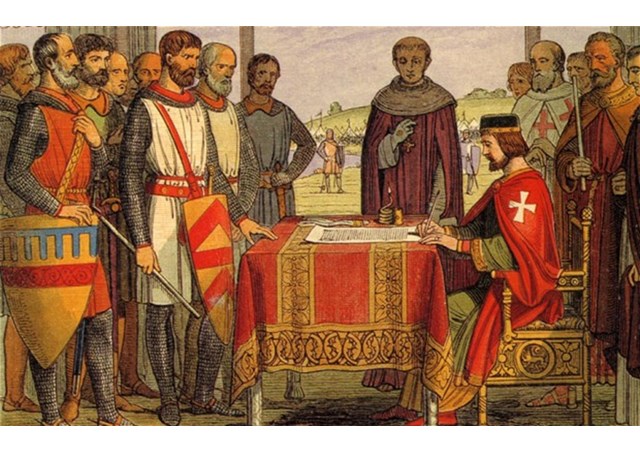
Celebrating 800 years since signing of 'Magna Carta'

(Vatican Radio) Monday June 15th marks the 800th anniversary of the signing of the Magna Carta or ‘great charter of liberties’, hailed throughout the world as a foundation text for individual rights and freedoms enshrined in our modern democracies. Britain’s Queen Elizabeth II will lead a commemorative celebration at Runnymede, south of London, at the site where the original document was sealed by a reluctant King John and a group of rebellious barons.
Two months after its signing, Magna Carta was annulled by Pope Innocent III, but several other versions of the treaty were subsequently drawn up and eight centuries on, the significance of this text is being recalled in countries across the globe – including here in Rome where a copy is on display at the British embassies to Italy and the Holy See.
But why is this document, signed in a muddy field on the banks of the River Thames, so significant for anyone concerned with human rights and the rule of law today? To try and answer that question, Philippa Hitchen spoke to Britain’s ambassador to the Holy See, Nigel Baker…
Listen:
Ambassador Baker notes that Magna Carta was one of the first clear statements that no man is above the law, setting out “some very basic requirements that the government must be accountable to the governed”. He points out that, despite its difficult beginnings, it became a source of inspiration for others concerned with democracy, from those drawing up the constitution of the United States to those drafting the Universal Declaration of Human Rights…
The ambassador goes on to explain how the Church played “an incredibly important role in the creation of Magna Carta and its subsequent history”. He notes that in any depiction of the event you’ll see the king surrounded by English, Welsh and Irish churchmen and the papal representatives as well, as they were determined to ensure that “no king could cut across the rights and liberties of the Church”. He also points out that the first clause of the document states that “the English Church shall be free”, one of the few clauses which is still applied in English law today…..
| All the contents on this site are copyrighted ©. |


